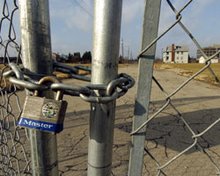There has been plenty of research on the legal ramifications of City of Norwood v. Horney, however, there have been no reports released on the economic impact of the failure of The Rookwood Expansion Project. From a legal standpoint, the city of Norwood has been put under a microscope by both Hamilton County and the State of Ohio. The determination of the property as "deteriorating" due to "diverse ownership" has been an especially sore point with the county, as well as local residents (2006 p74). Proposals have been put into effect (both voluntarily by the city as well as by the State of Ohio) to limit the use of eminent domain. This could have serious repercussions when Xavier University attempts to request the use of eminent domain to expand its campus later this year.
The economic impacts could prove to be an even larger problem for the city. It has only been in recent years that Norwood has managed to operate financially in the black (Due in large to the original Rookwood Commons shopping mall.) The 1987 closure of Norwood's General Motors plant resulted in the loss of more than 4,000 jobs and 35% of the City's tax base, putting the city in a position to operate for the next decade at a financial loss (1998 p1) In addition to the lost tax revenue to the city caused by the demolished houses, vacant properties in general have been shown to "impose a significant externality (cost) on neighboring property owners by lowering the market value of their properties." This also has an adverse effect on the city as well because "as properties lose market value, their assessed values decrease," which results in lower tax revenues. (2000 p303)
Sunday, May 6, 2007
Subscribe to:
Post Comments (Atom)


No comments:
Post a Comment